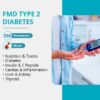- Your cart is empty
- Continue Shopping
‘All tests we do at FMD are aimed at finding the root cause of your health problem. These are not the usual diagnostic tests that you do, but much, much more.’
‘All tests we do at FMD are aimed at finding the root cause of your health problem. These are not the usual diagnostic tests that you do, but much, much more.’

₹7,999.00
Add to cart₹7,999.00
Test Parameters:
Type 2 diabetes is a metabolic disorder in which your body keeps away from using insulin the way it should. It’s symptoms include being very thirsty, blurry vision, fatigue, feeling hungry, weight-loss and many other things.
 Fasting Time: 9 to 12 Hours
Fasting Time: 9 to 12 Hours Reporting Time: 2 or 3 Days
Reporting Time: 2 or 3 Days
 Best and Honest Price
Best and Honest Price Free Home and Office Collection
Free Home and Office CollectionFMD Type 2 Diabetes will provide important information regarding:
Our Working Process Healthcare model is shifting from Sickness care to Wellness.
Sample collection will be done from home

Sample is processed at Central Lab of our Trusted Partners.

Reports are accessible online.
Sample collection will be done from home

Sample is processed at Central Lab of our Trusted Partners.

Reports are accessible online.
FAQ's Functional Medicine FAQ's
As per conventional thought the answer is yes, type 2 diabetes can also pass to your children.. The risk of developing diabetes is higher in kids if the mother or father has it. However, according to Functional Medicine, heredity may play a role in passing diabetes,but it is the environment both internal and external of human beings which is a much more deciding factor. You can carry bad genes but whether they will manifest or not, that decides on the environment you give to your body. Not everyone with a family history of type 2 diabetes will get it.
According to the conventional approach Diabetes is a condition which has no cure but can only be managed by diet changes and weight loss. According to functional medicine approach, Reversing type 2 diabetes is no longer a dream now.By changing diet ,environment internal means inside the body as well as external we can conquer this disease and reverse it.
Other Popular Test Packages Choose from our frequently booked test packages.
| Question |
|---|